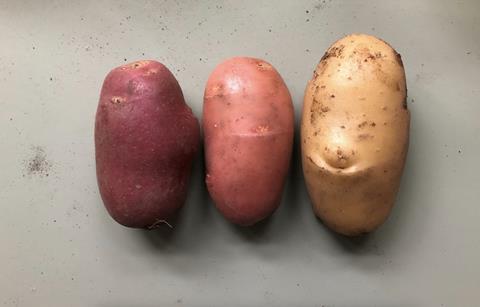New variety is developed using KeyGene’s proprietary 2S1 technique for creating graft hybrids

KeyGene has revealed that the Netherlands Board for Plant Varieties has granted plant breeders’ rights to a new potato variety, described as the first of its kind to feature a skin transplant.
The new variety has been developed using KeyGene’s proprietary 2S1 technique for creating graft hybrids, which the company said ”showcases the potential of this method”.
”The 2S1 technique allows for the creation of superior and stable new varieties by combining desirable skin traits, such as drought tolerance and insect repellence from one variety, with high-yield traits from another,” it stated.
KeyGene explained that the 2S1 potato variety combined the skin of Pimpernel with the inner cell layers of Bintje.
This way, the variety retained many of Bintje’s essential properties, supplemented with a ”suite of skin-related traits” from Pimpernel, which manifested on all above-ground plant parts plus the tubers.
Combining Pimpernel skin and Bintje inner cells proved to be stable, the group noted; after several years of seed potato production, the seed potatoes, the plants growing from the seed potatoes, and the potatoes produced by these plants ”faithfully maintain their unique combination of cell layers”.
“We have made an old breeding dream finally come true by developing a skin-grafted potato variety,” said Jeroen Stuurman, lead developer of the 2S1 technology.
”While this type of grafting is a rare natural phenomenon, sometimes seen to occur on grafted fruit trees in ancient orchards, our new 2S1 technology turns it into a rational technique to harness natural genetic variation for breeding purposes in an entirely new way.”
Roeland van Ham, CEO of KeyGene said, the company was “thrilled” to have achieved the breakthrough.
”It offers significant potential for the development of new varieties in vegetatively propagated crops, such as potato, fruit trees and berries, in a much shorter time frame.
”We also see potential for new product concepts in seed-propagated crops,” he outline. ”For all these crops, our technology can help address some of the toughest breeding challenges in sustainable food production.”
KeyGene said the granting of plant breeders’ rights by the Board for Plant Varieties in the Netherlands proved that skin-transplant varieties could be commercialised as new varieties.
”The new variety is a ‘proof-of-concept’; it shows the potential of KeyGene’s 2S1 technique to develop novel varieties that can uniquely combine favourable traits from different parent lines in a cost-efficient way and a significantly reduced amount of time,” it added.



